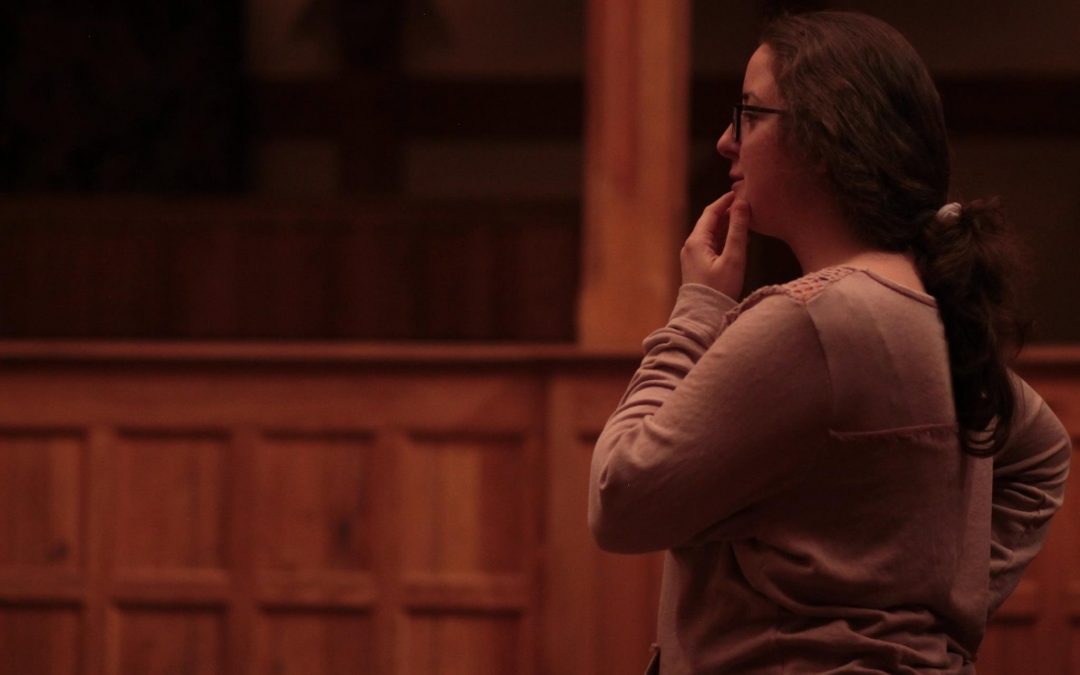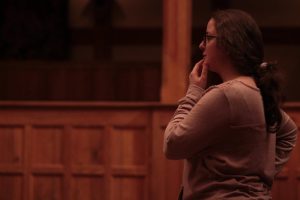By Christian Fernandez
Two virgins in disguise to avoid standing as sacrifices to Neptune. A man who rejects the love of a woman because he adores the moon. These charming stories make up John Lyly’s Gallathea and Endymion, which performed on February 12 and 13 respectively as part of the “Lylypalooza” festival of Second Year Shows. Both shows performed on the Blackfriars stage, providing a fascinating coupling of a pre-Shakespeare court drama and a Shakespearean commercial stage.
The directors for the two shows, Bethany Thomas (Gallathea) and Danielle Festa (Endymion) had worked on their plays since summer of 2017. Thomas loved Gallathea and was inspired by a conversation with a fellow student to pitch the play. “We realized that we both loved the play. We decided to give it a try and pitch it to the faculty, and they accepted it!” In contrast, Festa had not proposed Endymion. “Honestly, I originally pitched to direct The Insatiate Countess” said Festa, “but the faculty got excited to do something new when multiple Lyly plays were pitched.” Nevertheless, when the faculty asked Festa to direct Endymion, she was happy to accept.
Once both plays were cast in the fall, production work began. Early on in the production of Gallathea, Thomas got to enjoy her favorite memory from the process: the read-through. Thomas said “I had been living with this play since May, and the read through wasn’t until January…having it come to life in front of me, and hearing the actors realize that, while it may not be funny on paper, it is hilarious when performed.” It was during the read-through that she felt “the show went from being mine, to being ours.” Meanwhile, the Endymion team was working together on figuring out the best way to depict the text. Festa said “The biggest challenge was dealing with a non-Shakespeare early modern play-text that is entirely written in prose with monologues that go on for pages. The actors and I really had to find the characters’ shifts in thought and how to bring the audience with us.” To assist the cast, Festa researched and incorporated hand gestures discoursed by 17th century physician John Bulwer. Bulwer’s works examine the various hand gestures rhetoricians used for different moments and genres of speeches. This specific and thorough examination of the text and manners of acting the text resulted in the cast beginning to realize the humor of the play. As Festa said, it was as if a “light bulb went off and they said ‘That is funny; I get it now.’”
Aside from initial textual difficulties, Festa’s team had to face the challenge of continued illnesses. Multiple times, Festa had to figure out ways to change the rehearsal schedule without falling behind schedule. For Thomas, her biggest challenge was monologue work. “I love doing it” she said, “but this play has so many monologues that I was unsure how to differentiate the characters between their speeches.” Fortunately, Thomas’ actors were ready and worked hard with Thomas to figure out the monologues’ various beats and necessary. The actors were so prepared and ready to contribute their own thoughts that Thomas sometimes felt “like I didn’t have to do any work.”
Throughout the rehearsal process, each director had their own personal goals. Thomas sought to create a safe space “that the actors could come into and develop the show as a part of a team. I love making theatre, but the environment we make it in also matters.” Festa wanted to use teaching moments, such as using Bulwer’s hand motions, to “help the actors grow throughout the process.” However, the directors shared a common overall goal: both wanted to create charming pieces that audiences would enjoy. “I wanted to create a piece that the audience would love” said Thomas “and see this beautiful work with as much affection as I see it with.”
Photo courtesy of Caleb Stewart



